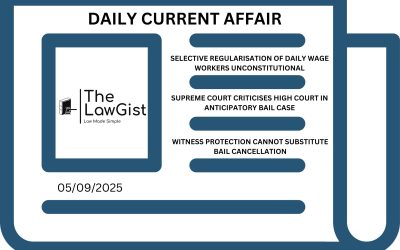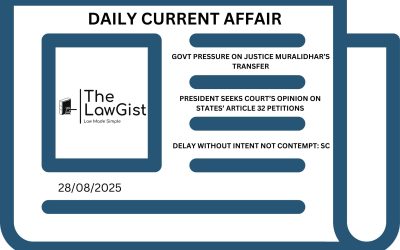On 13th Feb, the Government introduced the Advocates (Amendment) Bill 2025, but due to widespread protest and strike from the lawyers diue to Advocate (AMENDMENT) Bill 2025 Controversy, attorneys and Bar council, Govt withdrew the bill with the plans to create a revised version. The Bill was a groundbreaking legal reform with the aim to align India’s legal system with international standards.The Bill proposed to broaden the scope of legal practitioners, enforce regulation, improve oversight and improve the structure of legal education under Advocate Act,1961.
Key Proposed Changes
Expanded Definition of Legal Practitioner:
-
- Old Definition: Exclusive to traditional advocates, pleaders, and other court officials.
- New Proposal:
- The new proposal comprises corporate lawyers, in-house counsels, and legal professionals working in private and public organizations.
- Extends to statutory bodies and even foreign law firms.
Mandatory Bar Association Registration:
-
- Mandatory to register with Primary Bar Association- For Advocates who are practising before Court or tribunal or legal authorities.
- In case of any change in jurisdiction or area of practice of an Lawyer- Notification Duration is 30 Days
- Limited voting rights
Ban on Disruptive Strikes and Protests:
-
-
- SECTION 35A : Prohibits strikes and boycotts that disrupt court proceedings.
- Permits only one day or symbolic protest which do not disturb court proceedings.
-
Stricter Penalties and Enhanced Oversight:
-
- Penalties: Increased sanctions for unauthorized legal practice (up to one year of imprisonment and fines up to ₹2 lakh).
- Credential Verification: Advocates must undergo a five-yearly verification of their credentials and practice locations.
- Government Oversight:
- The Central Government can nominate up to three members to the Bar Council of India (BCI).
- It also gains the authority to issue directions regarding the implementation of the Act.
Reforms in Legal Education and Foreign Law Firms:
-
- Education: Mandatory pre- and post-enrollment training for law graduates, with a reinforced requirement to pass the All-India Bar Examination.
- Foreign Firms: Introduction of a regulatory framework to manage the entry and practice of foreign law firms in India.
GCAI’s (General Counsels’ Association of India) Recommendations and Legal Education Reforms
Maintaining the Advocate vs. Legal Practitioner Distinction:
- Legal practitioners in incorporated and registered organizations can choose either to enroll as advocates or continue practicing exclusively for their employers.
- Certification of legal experience by State Bar Councils or Bar Associations is proposed to validate a practitioner’s expertise.
Modernizing Legal Education:
- Implementation of mandatory pre- and post-enrollment training programs.
- Reinforcement of the requirement to clear the All-India Bar Examination.
- Regulatory measures for the entry of foreign law firms through rules framed by the Central Government.
Protests and Withdrawal of the Draft Bill
Reasons Behind the Protests:
- Concerns Over Autonomy: Many lawyers and bar associations fear the proposed changes could undermine the Bar Council of India’s independence.
- Specific Issue: Section 35A became the main reason for protest as it bans strikes and boycotts could hinder acceptable forms of dissent.
- Widespread Action: State Wise strike like in Uttar Pradesh and widespread protest reported from many regions of the country.
Government’s Response:
- Due to huge protests and public feedback the bill was withdrawn.
- The Ministry of Law and Justice stated that the consultation process would be concluded, and the draft would be revised to better address stakeholder concerns.
- Government will introduce the revised draft of the Bill for public review and consultation at the earliest.
The Road Ahead
Next Steps:
- Revising the Draft: The Central Government will take into account suggestions made by bar groups, legal experts, and other interested parties.
- Future Consultations: PUBLIC DISCUSSION will be taken in consideration for a fair and inclusive approach in amending the bill.
Importance of Collaboration:
- For striking a balance between modernisation and professional autonomy open communication and transparency while drafting the policy is really necessary.
- Stakeholder feedback is equally important and necessary for a strong legal framework.




Source- PIB








